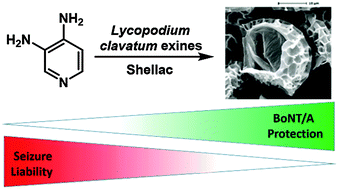Lycopodium clavatum exine microcapsules enable safe oral delivery of 3,4-diaminopyridine for treatment of botulinum neurotoxin A intoxication†
Abstract
3,4-Diaminopyridine has shown promise in reversing botulinum intoxication, but poor pharmacokinetics and a narrow therapeutic window limit its clinical utility. Thus, we developed a pH-dependent oral delivery platform using club moss spore exines. These exine microcapsules slowed 3,4-diaminopyridine absorption, limited its seizure activity, and enabled delivery of doses which prolonged mouse survival after botulism neurotoxin A intoxication.



 Please wait while we load your content...
Please wait while we load your content...